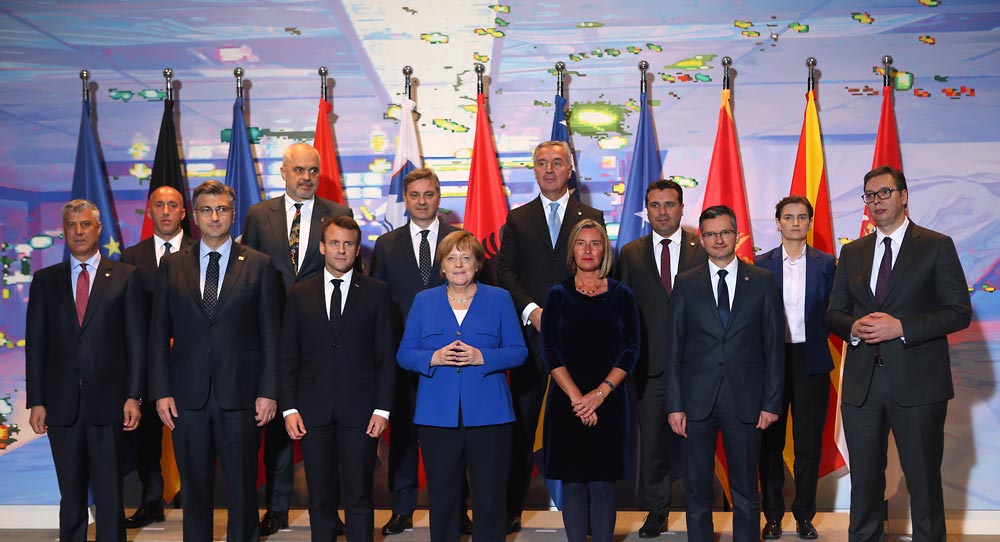As several countries celebrated the fifteenth anniversary of the big bang enlargement on May 1, there was little cause for jubilation in the Western Balkans.
A summit of the region’s leaders, hosted in Berlin by Chancellor Angela Merkel on April 29, exposed divisions and indecision instead of unity and strategy. The lack of any sustained, long-term policy toward the Western Balkans will play into the hands of Russia and China, as if EU leaders are not already aware of that possibility.
Indeed, it is more than worrying how European governments have consistently failed to take its own back yard—Albania, Bosnia and Herzegovina, North Macedonia, Montenegro, Serbia, and Kosovo—seriously. It’s as if the EU has learned little from the former Yugoslav war of the 1990s that exposed deep historical divisions among the big EU countries.The war finally ended in 1999. But it did not put closure to the centuries-old conflict between Serbia and Kosovo—a conflict that, to this day, divides the union. The EU has failed to adopt a united stance on recognizing the independence of Kosovo in 2008, with several countries, including Spain, opposing that new status. Serbia, which waged a policy of ethnic cleansing against the ethnic Albanians in Kosovo during the 1990s ending only after NATO intervened, has consistently rejected Kosovo’s unilateral declaration of independence.
Yet because Serbia wants to join the EU—as does Kosovo—Serbian President Aleksandar Vučić and his Kosovar counterpart, Hashim Thaçi, proposed a land swap on ethnic lines last year in a bid to normalize relations. The calculation was that if such a swap could be agreed, Serbia could then recognize Kosovo’s independence, one of the major conditions for starting accession talks with the EU.
Those bilateral talks not only broke down, but any idea of a land swap was vehemently opposed by Merkel and former diplomats and ministers who played a major role in ending the war in the former Yugoslavia. They believe it would set a very dangerous precedent. But the EU’s foreign policy chief, Federica Mogherini, and President Donald Trump’s national security advisor, John Bolton, supported the swap.
In the meantime, relations between Belgrade and Pristina have turned sour. In November 2018, Kosovo imposed a 100 percent tariff on Serbian goods because Belgrade has been lobbying against Kosovo joining Interpol, precisely because it would amount to this organization giving Kosovo’s independence more international legitimacy.
During the Berlin summit, Merkel, who has taken a close interest in the Western Balkans after she launched the “Berlin Process” in 2014, which was aimed at encouraging regional cooperation and closer integration, had hoped to kickstart a dialogue between Serbia and Kosovo. Another summit will be held in July 2019, this time hosted in Paris by President Emmanuel Macron.
Macron’s attitude toward the Western Balkans is completely at odds with Merkel’s. Merkel is not naïve enough to believe that these countries will join the union in the near future. The state institutions are very weak, corruption is rampant, and the economies are underdeveloped. But she knows that down the road the region’s place is in the EU.
Macron, however, has little interest in mentioning the “e” word. Further enlargement, in his view, would further weaken the cohesion of the EU and fuel populist or far right movements. It is a view shared by some other countries, including the Netherlands.
Yet what is even more disappointing about these divisions and lack of strategy is the EU’s attitude toward North Macedonia. Against all the odds, Greek Prime Minister Alexis Tsipras and North Macedonian Prime Minister Zoran Zaev managed to resolve a long and debilitating dispute over the future name of Macedonia. When the agreement was clinched between Athens and Skopje, it was an immense fillip for Zaev. Greece would no longer block Zaev’s ambitions to have his country join NATO and the EU.
Yet, for all the courageous steps in ending this dispute, the EU has been ungracious, to say the least. During the Berlin summit, Zaev was hoping he would be given a date for starting EU accession talks. Macron did not agree. Nothing like a slap in the face for Skopje and Athens.
The rest of the region still hopes that Merkel will change Macron’s mind. But for now, the EU’s policy toward the Western Balkans is divided and short-sighted.
Thankfully, these countries can still count on NATO to extend security and stability. In July 2018, it invited North Macedonia to join after previously admitting Montenegro, a move Russia had tried to prevent. Without the alliance, the region would be in a very sorry state and even more vulnerable to Russian interference.








